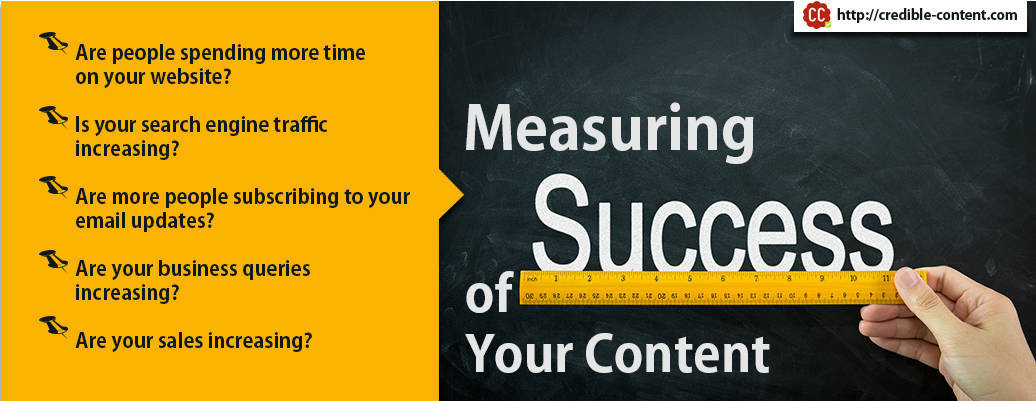 Many people wonder how to measure the success of their content, especially when they have to spend money and time on getting content for their website or blog.
Many people wonder how to measure the success of their content, especially when they have to spend money and time on getting content for their website or blog.
Just like any other aspect of your life, success can be measured in terms of tangible returns. The success of your content is not as esoteric and vague as it is made out to be by some content writers and content marketers. Solid results can be obtained from your content and the metrics of success can be as clearly defined as in any other marketing field, or for that matter, even better.
Whenever you need to measure the success of an event or an effort, you need “before” and “after” data. If you haven’t yet started your content marketing and you haven’t yet started publishing content on your website or blog, you must make note of your current situation. Gather data on
- How much traffic you are getting from search engines
- How much traffic you are getting from social media and social networking websites
- How much traffic you are getting from your email marketing campaigns
- How many people are subscribing to your email updates on a daily basis
- What is the engagement level on your website (how many people leave comments on your blog posts and online forums)
- How much time people are currently spending on your website
- How many back links you have got
- How much you are part of conversations happening on other websites and blogs
- How your primary and secondary keywords are performing right now
- How many business queries you are getting on a daily or weekly basis
- How much business you are generating currently
The list can have more attributes but this can give you a fair idea of the data that you should make note of before beginning to publish regular content on your website or blog and initiate your content marketing strategy.
Unless due to some fluke or unless you have got a ton of money to spend on marketing, your content won’t give you success in a few days or even a few weeks. You will have to observe the performance of your content for a few months before you can see the signs of success.
What are the signs?
Content marketing is very scientific whether one realizes it or not. The sort of content that you publish on your website or blog is going to decide how success manifests.
Depending on what sort of content you use in your content marketing strategy you may experience more traffic from search engines, more people talking about your brand on websites like Facebook, Twitter and LinkedIn, more people clicking the links in your email marketing campaigns, more people linking back to your website or individual webpages, more people spending more time on your website and eventually, more people doing business with you.
The greatest measure of success of your content is that people begin to trust you. They begin to recognize you. People trust you if through your content, you deliver value and they perceived the value of your content.
After publishing content and using the available channels to distribute your content you will need to revisit the 11 metrics mentioned above and see if they have improved or not.
- Has your search engine traffic increased?
- Has traffic from social media and social networking websites increased?
- Are you getting more clicks from your email marketing campaigns?
- Are greater number of people subscribing to your email campaigns?
- Has engagement on your website or blog increased and its quality improved?
- Are people spending more time on your website?
- Compared to the time when you had just started your content marketing, has the number of back links to your website or blog increased?
- Are more conversations taking place about your website or your brand on other websites and blogs?
- Has search engine traffic for your primary and secondary keywords (keywords that you are using in your content) increased?
- Are you getting more business queries on daily and weekly basis?
- Has your overall business increased ever since you started content marketing?
I would say, if the answers to even 2-3 questions above are yes, it can give you enough data to measure the success of your content.
